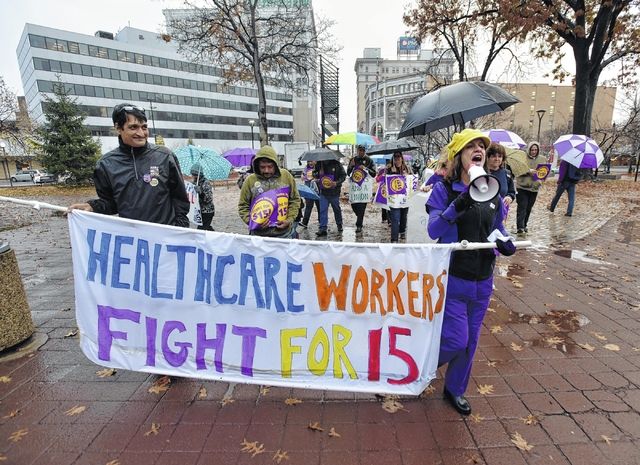Click here to subscribe today or Login.
WILKES-BARRE — “Hey, hey! Ho, ho! Poverty wages got to go!” chanted about two dozen caregivers who work in nursing facilities in the area along with some supporters who marched in a light rain from Public Square to City Hall on Tuesday.
Service Employees International Union Healthcare PA organized a rally on Public Square that preceded the march as part of a statewide Nursing Home Day of Action to call for a starting wage of $15 an hour and quality resident care.
Chris Sloat, a licensed practical nurse and one of the SEIU rally organizers, said many nursing home employees are working two jobs to get by.
“What kind of care are you giving when you’re preoccupied and exhausted and you can’t pay your bills working 40 hours a week?” Sloat, of Wilkes-Barre, said.
“We work for an industry that made over $400 million (in profits) in Pennsylvania last year off our tax dollars. It’s time that money goes back into rebuilding our communities,” Sloat said.
If nursing home workers had a starting rate of $15 an hour, Sloat said, it would put over $300 million into the paychecks of caregivers across the state.
“Right here in Luzerne County, it would mean roughly $10 million in wages and another $1 million in state and local tax revenue. Imagine what that would mean. We could begin to have an economy that allows us to invest in our communities and have the services we need not just to survive, but to thrive,” she said.
With 4-year-old daughter Audriana standing next to her and holding an umbrella of her own, certified nursing assistant Brittney Perri said she came to the rally “to make it known we need a more fair wage to be able to live on with the important jobs that we do.”
Describing her work as strenuous and stressful and important, Perri, 19, of Plymouth, said she “just left a job that was paying me $8.25” and was fortunate to find one paying $11.25 an hour.
Perri said she relies on public assistance in addition to her wages to get by.
“There’s no way I’d be able to do it without it,” Perri said. I work hard to provide the best care I can to my residents and I do my best to support my family. But at the end of the day, there’s just something wrong when you do everything right but still end up short.”
A healthcare worker for more than four years, Michelle LaCroix, 25, of Scranton, said she is a direct service professional in a day program setting for adults with intellectual and developmental disabilities.
“I work with people who need intensive support and care and are, frankly, oftentimes very challenging. And for this, I earn $10.50 an hour. The pay for a job taking care of some of the most vulnerable adults means I live paycheck to paycheck, but just barely. By the time I get near the end of a two-week pay period, I’m lucky if I have $10 for gas money,” LaCroix said.
She applied for public assistance, but was told she made too much money to qualify, she said.
“It’s a shame, because I can see myself making a career of this work. I love taking care of people,” LaCroix said. “I thought about going back to school, but that would mean cutting back on hours, and that’s just not an option.”
“Just like nursing homes, my job is publicly funded through Medicaid. And just like in nursing homes, we have lots of turnover. And that’s not good for the people we care for. If any of you have ever spent time with someone with autism, you know how important routine is,” LaCroix said.
“If someone quits — and they do all the time — it’s very upsetting for the people I work with. They need to see the same person every day. Routine is crucial. And turnover is the worst thing that could happen. I think a $15 an hour wage would make a huge difference to me and the people I care for. For me, it would mean almost $10,000 a year more in my paycheck,” she said.
Tuesday’s rally took place less than a week after a new study from Keystone Research Center revealed that 15,000 nursing home workers in Pennsylvania are forced to rely on public assistance because of poverty wages, A news release from the SEIU noted.
Public assistance to nursing home workers costs taxpayers an estimated $118 million a year, according to the KRC report.
“Because nursing homes receive the majority of their funding from Medicaid and Medicare, the industry is ‘double-dipping’ on taxpayer dollars when it pays low wages and forces workers to rely on state-funded public assistance,” the SEIU said.
Sloat said nursing homes made more than $400 million in profits in fiscal year 2014 and can afford to increase wages for workers.
“Instead of putting the extra money into their pockets, it should go into their workers’ pockets,” Sloat said of nursing home owners and investors. “An industry that makes $400 million a year in profit, their workers shouldn’t have to be on public assistance. It’s not like they want to be on public assistance; they have no other choice.”





